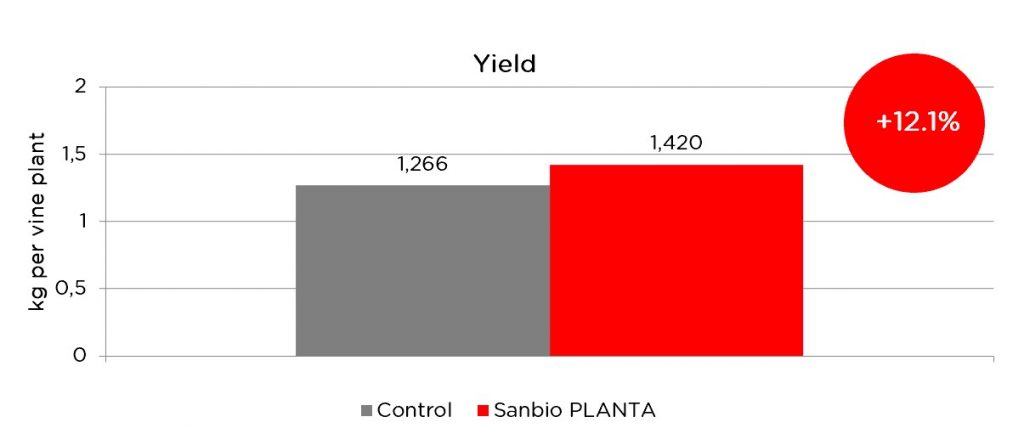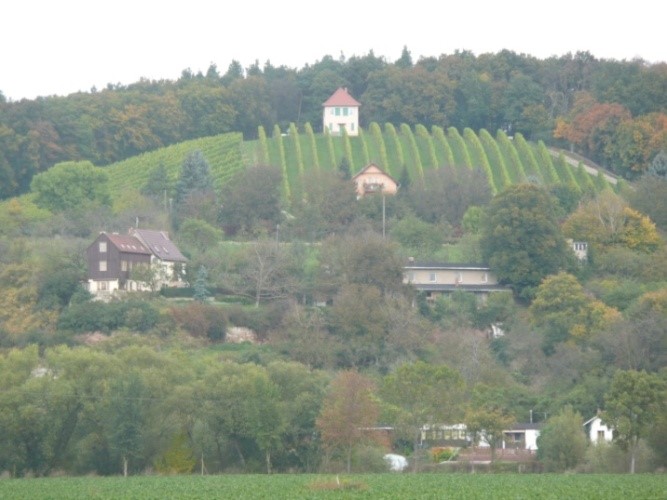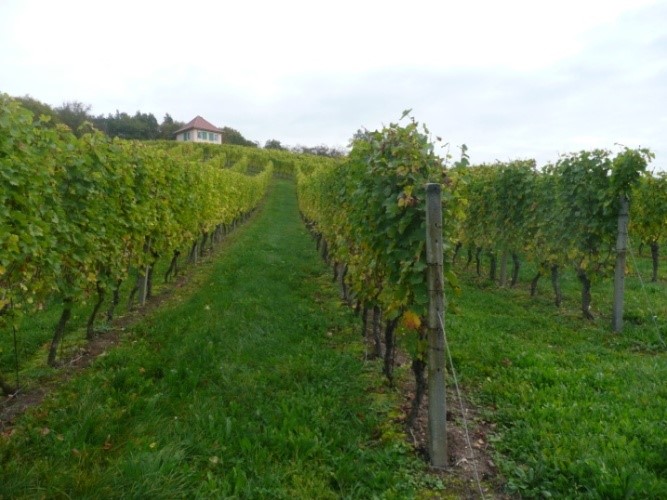It is also frost-resistant and a very dependable bearer of high-quality grapes which have an acidity level that gives the wine a racy freshness and contributes to its long life. To reach its full potential, Riesling needs extra days of sun; ripening is very late, indeed the Riesling grapes are the ones to be picked at the end of the harvest.
Riesling produces elegant wines of rich character with an incomparable fragrance and taste, often reminiscent of peaches, or (when the wine is still young) of apples. In 1996, the vineyard area planted with Riesling topped that of Müller-Thurgau. Therefore, today it is known as Germany’s premier grape variety in terms of area.
The aim of this study is to evaluate the effects of ferti-activator Sanbio PLANTA on productivity of grapes variety ´Riesling´.
1. Background
Vines have been cultivated since AD 998 on the hillsides lining the Saale and the Unstrut rivers which lend their name to the small, but growing, Saale-Unstrut region. It is among the northernmost of Europe’s traditional wine regions. Due to this and the cooler climate, the weather is more variable than in the regions in the west. As such, many of the vines are planted on labor-intensive stone terraces that help temper the climate. Yields are low and Spätlese or Auslese can be produced only in exceptionally warm years. The wines are labelled as varietals and, with the exception of extremely rare dessert wines, all wines are vinified dry and have a refreshing acidity.
This study was executed in cooperation with the winery Bernard Pawis, located in Zweiplitz, Saale-Unstrut region, Saxony-Anhalt, Germany.
Winery Pawis is one of the most successfully wineries in Germany and achieved:
- Award “Winemaker of the Year 2014” issued by “Falstaff Wein Trophy”
- Inclusion into “List of 100 best German wineries” issued by the “Handelsblatt”
- Inclusion into Vine Guide “Gault & Millau 2013”
- Member of Association of German Top Quality Wine Estates „Verband der Deutschen Prädikatsweingüter“ (VDP)
- Numerous wards.
1. Materials and methods
Table 1. Basic data
| Season | 2014 |
| Location | Germany, State Saxony-Anhalt, Naumburg, Naumburger Sonneck  Picture 1: Left: Untreated vineyard (Control), Right: Treated vineyard (PLANTA) |
| Direction | South-Southwest |
| Angle | 10° – 30° |
| Organization | Winery Bernard Pawis |
| Crop | Grapevine |
| Variety | Riesling |
| Trial field | 1 block system |
| Soil quality | Lime gravel with loessic loam, transition to weathered red sandstone and keuper |
| Climate | Continental, with warm, dry summers and cold winters |
| Rainfall | Annual 729mm (resp. 92% of long-term average 789mm) |
| Test product | Sanbio PLANTA, manufactured by SANBOS GmbH, Germany |
| Dosage | 2 kg/ha, 500 l water/ha |
| No. of applications | 1 |
| Date of application | 24/03/2014, BBCH 13-15 |
| Date of harvest | 02/10/2014 |
| Scoring | Weight / Yield |
Table 2. Product presentation of Sanbio PLANTA
| Product name | Composition | Description | Application |
| Sanbio PLANTA | Activated blend of natural seaweed, nutrients, trace elements, selectively and adapted highly effective natural bacterial cultures and mycorrhiza fungi, activated by SANBIO Biocatalytical Stimulation Technology | Fertilizer and biological activator (certified in France, Germany, EC, USA)Stimulation of plant growth and immunityBetter protection against fungal diseases and biotic and abiotic stressBetter control of factors favorable to plant growthBetter germination and growth of vegetation and development of roots and shootsColonization of roots by beneficial microorganismsBetter mobilization and assimilation of nutrientsEarly flowering and maturationIncreased production and improved quality | Dosage: 1.5 kg / ha in 200-500 l of water No. of application: 1-2 Mode of application: Soil application Stage of application: 3-5 leaf stage |
2. Results
2.1 Yield
Table 3. Productive performance
| Treatment | Control | PLANTA | |
| No of vine plants per area | 2527 | 2077 | |
| Weight per area | kg | 3200 | 2950 |
| Weight per vine plant | kg | 1.266 | 1.42 |

Figure 1. Yield calculated as weight of grapes per vine (kg/vine)
The yield calculated as weight of grapes per vine was increased by 0.154 kg/vine, resp. +12.1% at the treated plot compared to untreated control lot.
2.2 Pictures

Picture 2. Vineyard with both plots

Picture 3. Experimental field (treated with Sanbio PLANTA)
3. Conclusion
To summarize, the present study shows significantly positive effects of ferti-activator Sanbio PLANTA on productive performance of vinegrapes.
The positive effects at glance:
- Higher harvest of +12.1%.